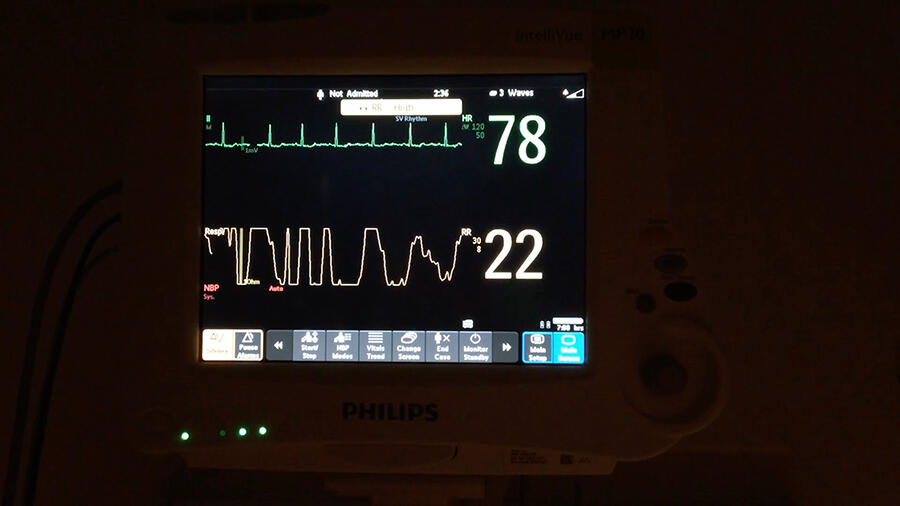The Legacy of Artist and Activist Lizzy Rose
A multi-venue posthumous retrospective memorializes her imaginative artistic approach to sickness
A multi-venue posthumous retrospective memorializes her imaginative artistic approach to sickness

Audience's imagination can be kept alive by an artist’s works long after their creators have gone. This is true of the artist Lizzy Rose, who passed away in January 2022, following a long struggle with Crohn’s disease. Before her death, Rose requested that her good friends, exhibition organiser Matthew de Pulford and artist Katie Hare, organize a retrospective of her work. ‘Things I Have Learned the Hard Way’ is the resulting multi-venue exhibition in Margate, at CRATE, LIMBO, Turner Contemporary and Well Projects. Rose’s friend and collaborator Leah Clements also curated a corresponding evening of screenings and performances around the artist’s work at London’s Institute of Contemporary Art on 12 April. ‘One Day I Will Feel My Power’ was streamed online – and recorded for later viewing – by Wysing Broadcasts and featured works by Clements, Benedict Drew, Alice Hattrick, Carolyn Lazard, Abi Palmer and RA Walden.

Though I never had the good fortune to meet Rose, her artistic thinking and approach to sickness greatly influenced my own practice and positionality as a disabled artist. In and out of the hospital for much of her life, Rose continued to create from her sick bed, endowing quotidian medical sites with beauty, humour and wonderment. ‘Things I Have Learned the Hard Way’ provides an opportunity to walk through the inner workings of her imaginative mind. Each venue addresses a different aspect of Lizzy’s oeuvre, some spaces re-staging past exhibitions and installations in full. It is a privilege to identify threads that run through Rose’s thinking, and see how her ideas took shape over the years.
On display at Turner Contemporary, Rose’s series ‘Hospital Watercolour Club’ (2014), features idiosyncratic observational still life works of hospital wares. She depicts a bottle of hand sanitizer, a fire alarm and a mobility grab handle with careful attention to detail, reclaiming the aesthetic qualities of these functional objects, and revealing her capacity to find sources of inspiration in unlikely places. The works appear in a corridor against a two-tone light and dark blue wall, colours redolent of hospital waiting rooms, beside the watercolour and pencil series ‘You meming about your illness is making me uncomfortable’ (2014), in which she recreated internet memes using humour to process her frustrations with societal responses to sickness.

Rose lived in Margate, by the sea, and the works seem to encapsulate how an artist’s surroundings can shape their thinking. The exhibition at CRATE explores her affinity with whales. In the video and sculpture installation Sick, blue sea (2018), the artist married photographs of a dead whale washed up on the shoreline with a fictionalized film of a melancholic young sperm whale, blogging about its ongoing nausea caused by swallowing plastic that has clogged up its digestive system: a condition somewhat similar to that caused by Rose’s own autoimmune disease. Employing what De Pulford described to me as a ‘tech forward’ approach to the natural world, Rose returned again and again to the ways plant life can benefit from technological and human intervention. On view at Well Projects, Intravenous Living Salad (2018) contains her total parenteral nutrition (TPN) bag, which hangs above a pile of salad leaves. Rose used the TPN to grow and sustain the leaves. I interpret the work as a tongue-in-cheek nod to the kind of unsolicited advice that people with chronic illnesses often receive from strangers: eat more greens.

Elsewhere, at LIMBO, a standout work, Arrangement, recreates Rose’s 2017 exhibition at the same venue. Initially produced following her research trip to Tokyo in 2016, the show considers the Japanese practice of Ikebana, a type of flower arranging. The Meaning of the Wild (2017), a film of people engaging in Ikebana, appears on a screen within a natural installation containing real moss beds and orchids planted for this occasion by Rose’s mum. Here, we are encouraged to remove our shoes and socks and sink our feet into the bed of moss, a grounding practice. The installation recalls the film’s consideration of the potential of Ikebana to build a smaller version of an imagined environment. Once again, Rose’s imagination opens the possibility of thinking beyond her immediate circumstances, connecting with the outside world when she couldn’t leave the house.

Pathos creeps into the retrospective, as in the witty In the Studio: In Hospital (2015), a funeral-esque flower arrangement shaped in the letters ‘BRB’ (be right back), and My Heart Will Go On (2018), a film pairing a heart rate and respiration monitor with a droll, simple keyboard version of Celine Dion’s hit song ‘My Heart Will Go On’ (1997). Yet, more than anything, the exhibitions engender an unwavering sense of life. Whether approaching thoughtful, complex, serious or fantasized topics, Rose always looked for the funny side. And as I watch her in a short blonde wig and sequined playsuit, dancing rapidly and confidently to Latin music in the film Feeling the Fantasy (2015), I am filled with joy and gratitude at having this opportunity to familiarize myself with her brilliant mind.
‘Things I Have Learned the Hard Way’ is on view at at various venues in Margate until 23 April
Main image: Lizzy Rose, Sick blue sea, 2018, papier-mâché mouth sculpture, ambergris marshmallows. Courtesy: the artist; photograph: Steven Cass























